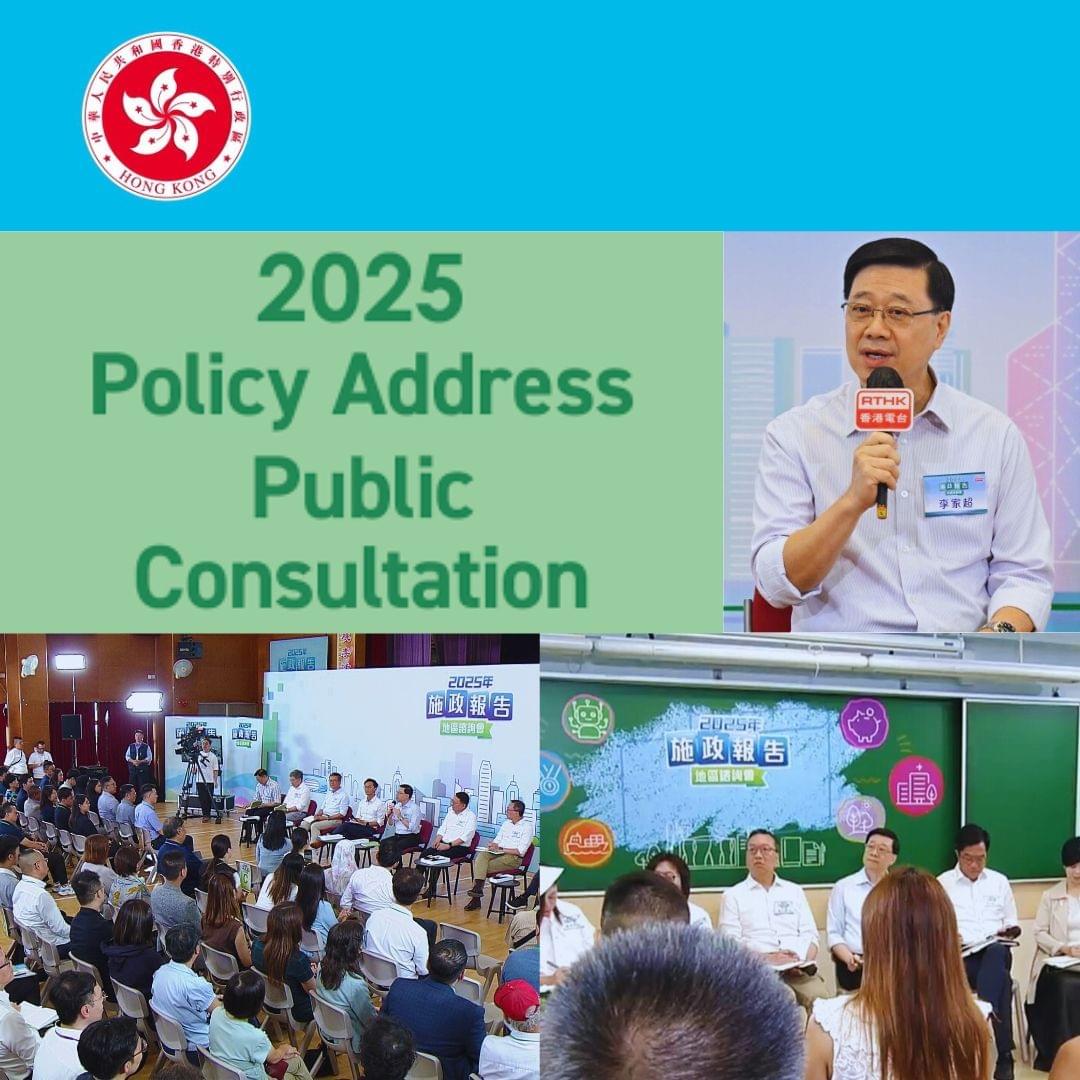Chief Executive John Lee
Attends First Regional Consultation for 2025 Policy Address
Chief Executive John Lee
Attends First Regional Consultation for 2025 Policy Address

Hong Kong, July 27, 2025 – Chief Executive John Lee, accompanied by senior officials including Deputy Secretary for Justice Horace Cheung, Secretary for Culture, Sports and Tourism Rosanna Law, and Secretary for Security Chris Tang, attended the first regional consultation session for the 2025 Policy Address at Ma Tau Chung Government Primary School in Hung Hom. The event brought together over 110 community members for face-to-face discussions, gathering public opinions to shape the upcoming fourth Policy Address in September. Lee, who grew up in the Hung Hom and To Kwa Wan area, expressed a sense of familiarity, stating that he felt "filled with passion" returning to the neighborhood. He emphasized the importance of policies being "grounded" and aligned with citizens' needs to build a caring and inclusive Hong Kong.
During the consultation, community members raised concerns on a range of issues, including housing, the economy, youth development, ethnic minority employment, and fertility rates. Residents of Yau Tsim Mong expressed worries about the regulation of "simplified housing" (subdivided flats), fearing that landlords upgrading units could raise rents, burdening grassroots families. They suggested issuing consumption vouchers to eligible low-income households to ease financial pressures and stimulate the economy. Representatives from non-governmental organizations highlighted the shortage of youth hostel places, with only about 3,000 units meeting just 0.4% of the demand for 20- to 30-year-olds. They called for more hostel spaces and preferential housing schemes, such as priority for Home Ownership Scheme (HOS) applications, to support young people’s homeownership aspirations.
In response, Chief Executive Lee stressed a macro approach to policymaking, aiming to "grow the pie" for the benefit of all Hong Kong residents while addressing individual needs to ensure "everyone’s pie gets bigger." He underscored the importance of community feedback in shaping policies and pledged to leverage platforms like the 18 District Councils, Care Teams, and community organizations to enhance local governance and ensure policies take root.
The issue of Hong Kong’s low fertility rate sparked lively discussion, with attendees commending recent government initiatives. Citizens proposed government-organized matchmaking events to help young people find compatible partners, fostering marriage and childbirth. Financial sector representatives suggested tax exemptions and subsidies for hiring domestic helpers to further encourage fertility. Lee acknowledged these concerns, highlighting the government’s comprehensive pro-fertility measures, including the "Newborn Baby Priority Housing Scheme," childcare services, tax deductions, and newborn cash incentives. These policies aim to alleviate financial burdens on young families and create a supportive environment for raising children, demonstrating the government’s commitment to addressing the fertility challenge.
An ethnic minority kindergarten teacher shared the language and cultural barriers faced by her community in the job market, noting that women wearing headscarves often face hiring discrimination due to their appearance. She urged the government to foster a fairer and more inclusive employment environment and provide tutoring support to enhance the competitiveness of ethnic minority students. Representatives from the construction industry highlighted reduced project volumes post-pandemic, which have limited youth employment opportunities. They proposed tax relief or low-interest loans for private developers to expedite projects and create jobs.
Lee responded by committing to streamline approval processes and reduce bureaucratic hurdles to invigorate sectors like finance and construction. He also emphasized efforts to integrate ethnic minorities, noting their participation in initiatives like Care Teams, and promised further enhancements to promote inclusivity.
Attendees proposed creative ideas, including temporarily designating pedestrian areas for street performers, establishing community innovation labs with relaxed copyright restrictions, and converting vacant wet markets into senior healthcare centers. Representatives from the arts sector suggested creating a "Cultural Street" to promote intangible cultural heritage, aligning with practices in mainland Chinese cities. A surveying student raised concerns about the progress of the Northern Metropolis and urban redevelopment, urging the government to provide clear timelines to boost industry confidence.
Lee described these suggestions as inspiring and promised to refer them to the 18 District Councils and community organizations for further study and tailored implementation. He emphasized that local governance must adapt to each district’s unique characteristics to meet practical needs.
Participants, including district councilors, community organization members, youth, and women’s groups, offered diverse perspectives on livelihood issues. Lee reiterated that the government, as the "policy supplier," must listen to citizens to align policies with their needs. He described consultation sessions as a vital channel for "bottom-up" feedback, expressing hope to work with all sectors to build a caring and inclusive Hong Kong.
The public consultation for the 2025 Policy Address began on June 16, with today’s event marking the first regional session. The government will continue engaging various districts and sectors to gather input, laying a solid foundation for the Policy Address to be delivered in September.